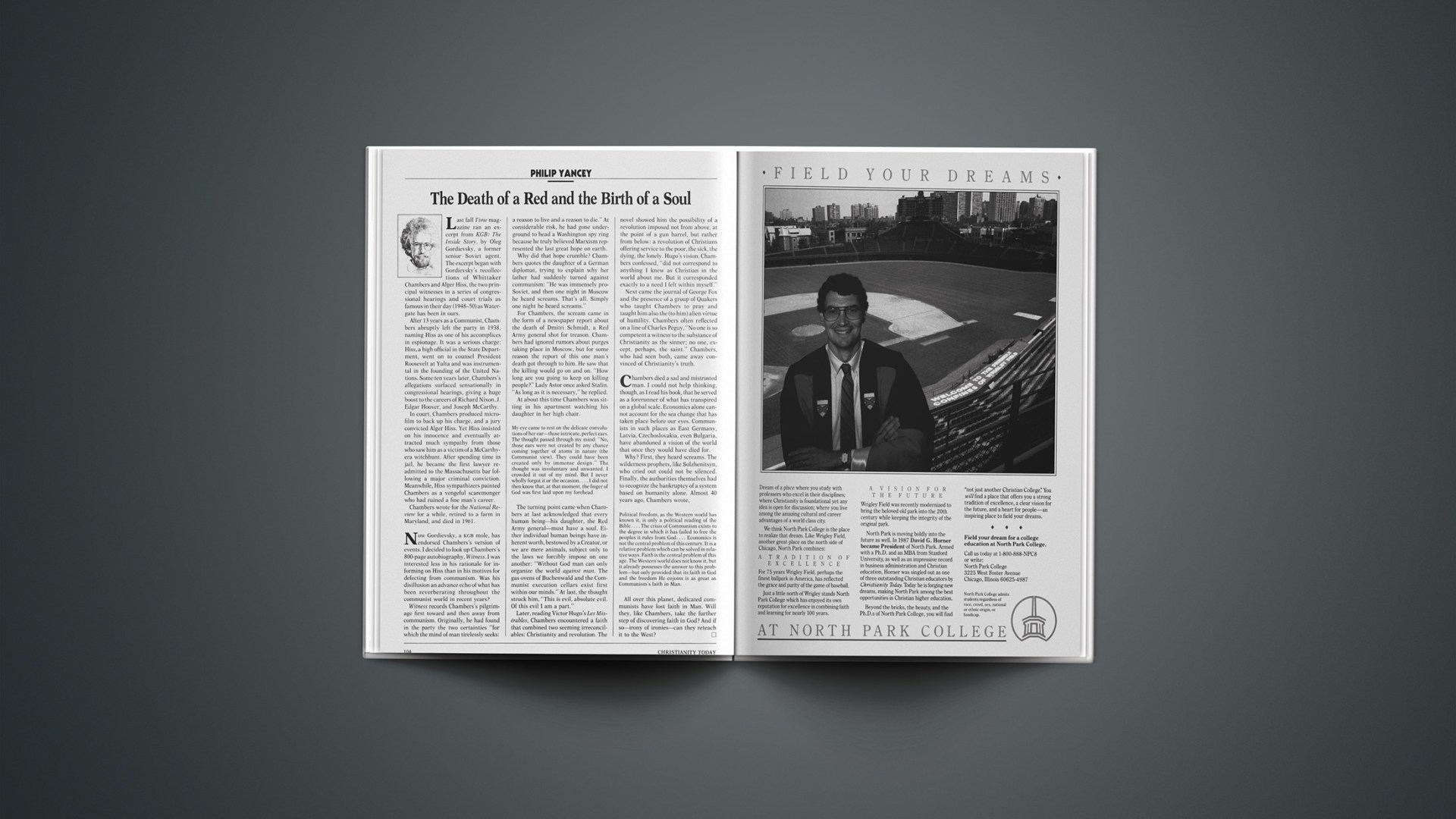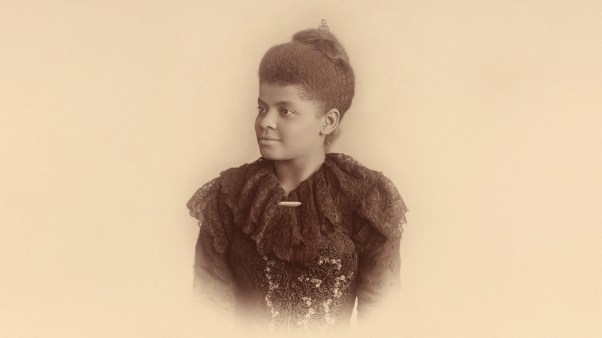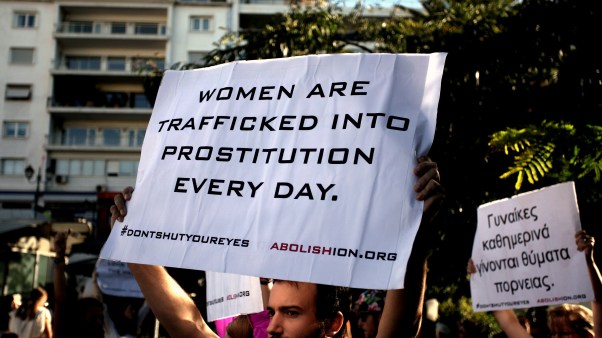Last fall Time magazine ran an excerpt from KGB: The Inside Story, by Oleg Gordievsky, a former senior Soviet agent. The excerpt began with Gordievsky’s recollections of Whittaker Chambers and Alger Hiss, the two principal witnesses in a series of congressional hearings and court trials as famous in their day (1948–50) as Watergate has been in ours.
After 13 years as a Communist, Chambers abruptly left the party in 1938, naming Hiss as one of his accomplices in espionage. It was a serious charge: Hiss, a high official in the State Department, went on to counsel President Roosevelt at Yalta and was instrumental in the founding of the United Nations. Some ten years later, Chambers’s allegations surfaced sensationally in congressional hearings, giving a huge boost to the careers of Richard Nixon, J. Edgar Hoover, and Joseph McCarthy.
In court, Chambers produced microfilm to back up his charge, and a jury convicted Alger Hiss. Yet Hiss insisted on his innocence and eventually attracted much sympathy from those who saw him as a victim of a McCarthyera witchhunt. After spending time in jail, he became the first lawyer readmitted to the Massachusetts bar following a major criminal conviction. Meanwhile, Hiss sympathizers painted Chambers as a vengeful scaremonger who had ruined a fine man’s career.
Chambers wrote for the National Review for a while, retired to a farm in Maryland, and died in 1961.
Now Gordievsky, a KGB mole, has endorsed Chambers’s version of events. I decided to look up Chambers’s 800-page autobiography, Witness. I was interested less in his rationale for informing on Hiss than in his motives for defecting from communism. Was his disillusion an advance echo of what has been reverberating throughout the communist world in recent years?
Witness records Chambers’s pilgrimage first toward and then away from communism. Originally, he had found in the party the two certainties “for which the mind of man tirelessly seeks: a reason to live and a reason to die.” At considerable risk, he had gone underground to head a Washington spy ring because he truly believed Marxism represented the last great hope on earth.
Why did that hope crumble? Chambers quotes the daughter of a German diplomat, trying to explain why her father had suddenly turned against communism: “He was immensely pro-Soviet, and then one night in Moscow he heard screams. That’s all. Simply one night he heard screams.”
For Chambers, the scream came in the form of a newspaper report about the death of Dmitri Schmidt, a Red Army general shot for treason. Chambers had ignored rumors about purges taking place in Moscow, but for some reason the report of this one man’s death got through to him. He saw that the killing would go on and on. “How long are you going to keep on killing people?” Lady Astor once asked Stalin. “As long as it is necessary,” he replied.
At about this time Chambers was sitting in his apartment watching his daughter in her high chair.
My eye came to rest on the delicate convolutions of her ear—those intricate, perfect ears. The thought passed through my mind: “No, those ears were not created by any chance coming together of atoms in nature (the Communist view). They could have been created only by immense design.” The thought was involuntary and unwanted. I crowded it out of my mind. But I never wholly forgot it or the occasion.… I did not then know that, at that moment, the finger of God was first laid upon my forehead.
The turning point came when Chambers at last acknowledged that every human being—his daughter, the Red Army general—must have a soul. Either individual human beings have inherent worth, bestowed by a Creator, or we are mere animals, subject only to the laws we forcibly impose on one another: “Without God man can only organize the world against man. The gas ovens of Buchenwald and the Communist execution cellars exist first within our minds.” At last, the thought struck him, “This is evil, absolute evil. Of this evil I am a part.”
Later, reading Victor Hugo’s Les Misérables, Chambers encountered a faith that combined two seeming irreconcilables: Christianity and revolution. The novel showed him the possibility of a revolution imposed not from above, at the point of a gun barrel, but rather from below: a revolution of Christians offering service to the poor, the sick, the dying, the lonely. Hugo’s vision, Chambers confessed, “did not correspond to anything I knew as Christian in the world about me. But it corresponded exactly to a need I felt within myself.”
Next came the journal of George Fox and the presence of a group of Quakers who taught Chambers to pray and taught him also the (to him) alien virtue of humility. Chambers often reflected on a line of Charles Péguy, “No one is so competent a witness to the substance of Christianity as the sinner; no one, except, perhaps, the saint.” Chambers, who had seen both, came away convinced of Christianity’s truth.
Chambers died a sad and mistrusted man. I could not help thinking, though, as I read his book, that he served as a forerunner of what has transpired on a global scale. Economics alone cannot account for the sea change that has taken place before our eyes. Communists in such places as East Germany, Latvia, Czechoslovakia, even Bulgaria, have abandoned a vision of the world that once they would have died for.
Why? First, they heard screams. The wilderness prophets, like Solzhenitsyn, who cried out could not be silenced. Finally, the authorities themselves had to recognize the bankruptcy of a system based on humanity alone. Almost 40 years ago, Chambers wrote,
Political freedom, as the Western world has known it, is only a political reading of the Bible.… The crisis of Communism exists to the degree in which it has failed to free the peoples it rules from God.… Economics is not the central problem of this century. It is a relative problem which can be solved in relative ways. Faith is the central problem of this age. The Western world does not know it, but it already possesses the answer to this problem—but only provided that its faith in God and the freedom He enjoins is as great as Communism’s faith in Man.
All over this planet, dedicated communists have lost faith in Man. Will they, like Chambers, take the further step of discovering faith in God? And if so—irony of ironies—can they reteach it to the West?










